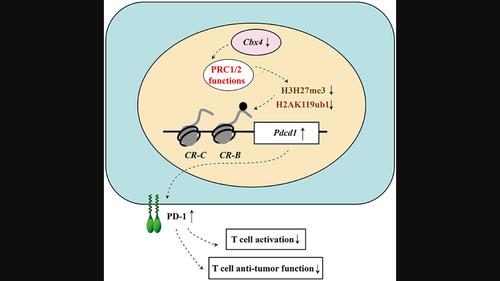当前位置:
X-MOL 学术
›
Mol. Oncol.
›
论文详情
Our official English website, www.x-mol.net, welcomes your
feedback! (Note: you will need to create a separate account there.)
CBX4 promotes antitumor immunity by suppressing Pdcd1 expression in T cells
Molecular Oncology ( IF 5.0 ) Pub Date : 2023-09-10 , DOI: 10.1002/1878-0261.13516
Liwei Ren 1 , Ziyin Li 1 , Yu Zhou 2 , Jun Zhang 1 , Ziheng Zhao 1 , Zhaofei Wu 1 , Ye Zhao 1 , Yurong Ju 1 , Xuewen Pang 1 , Xiuyuan Sun 1 , Wei Wang 1 , Yu Zhang 1, 3
Molecular Oncology ( IF 5.0 ) Pub Date : 2023-09-10 , DOI: 10.1002/1878-0261.13516
Liwei Ren 1 , Ziyin Li 1 , Yu Zhou 2 , Jun Zhang 1 , Ziheng Zhao 1 , Zhaofei Wu 1 , Ye Zhao 1 , Yurong Ju 1 , Xuewen Pang 1 , Xiuyuan Sun 1 , Wei Wang 1 , Yu Zhang 1, 3
Affiliation

|
E3 SUMO-protein ligase CBX4 (CBX4), a key component of polycomb-repressive complexes 1 (PRC1), has been reported to regulate a variety of genes implicated in tumor growth, metastasis, and angiogenesis. However, its role in T-cell-mediated antitumor immunity remains elusive. To shed light on this issue, we generated mice with T-cell-specific deletion of Cbx4. Tumor growth was increased in the knockout mice. Additionally, their tumor-infiltrating lymphocytes exhibited impaired tumor necrosis factor-alpha (TNF-α) and interferon-gamma (IFN-γ) production, with an elevated programmed cell death protein 1 (PD-1) level. In fact, dysregulated Pdcd1 expression was observed in all major subsets of peripheral T cells from the knockout mice, which was accompanied by a functional defect in response to T-cell receptor (TCR) stimulation. In support of a direct link between CBX4 and PD-1, Cbx4 overexpression resulted in the downregulation of Pdcd1 expression. Epigenetic analyses indicated that Cbx4 deficiency leads to diminished accumulation of inhibitory histone modifications at conserved region (CR)-C and CR-B sites of the Pdcd1 promoter, namely mono-ubiquitinated histone H2A at lysine 119 (H2AK119ub1) and trimethylated histone H3 at lysine 27 (H3K27me3). Moreover, inhibition of either the E3 ligase activity of polycomb-repressive complexes 1 (PRC1) or the methyltransferase activity of polycomb-repressive complexes 2 (PRC2) restores Pdcd1 expression in Cbx4-transfected cells. Cumulatively, this study reveals a novel function of CBX4 in the regulation of T-cell function and expands our understanding of the epigenetic control of Pdcd1 expression.
中文翻译:

CBX4通过抑制T细胞中Pdcd1的表达来促进抗肿瘤免疫
E3 SUMO 蛋白连接酶 CBX4 (CBX4) 是多梳抑制复合物 1 (PRC1) 的关键成分,据报道可调节多种与肿瘤生长、转移和血管生成有关的基因。然而,它在 T 细胞介导的抗肿瘤免疫中的作用仍然难以捉摸。为了阐明这个问题,我们培育了 T 细胞特异性删除Cbx4的小鼠。基因敲除小鼠的肿瘤生长增加。此外,他们的肿瘤浸润淋巴细胞表现出肿瘤坏死因子-α (TNF-α) 和干扰素-γ (IFN-γ) 产生受损,程序性细胞死亡蛋白 1 (PD-1) 水平升高。事实上,在基因敲除小鼠的所有主要外周 T 细胞亚群中均观察到Pdcd1表达失调,并伴有响应 T 细胞受体 (TCR) 刺激的功能缺陷。为了支持 CBX4 和 PD-1 之间的直接联系, Cbx4过表达导致Pdcd1表达下调。表观遗传学分析表明, Cbx4缺陷导致Pdcd1启动子保守区 ( CR ) -C和CR-B位点的抑制性组蛋白修饰积累减少,即赖氨酸 119 处的单泛素化组蛋白 H2A (H2AK119ub1) 和赖氨酸处的三甲基化组蛋白 H3 27(H3K27me3)。此外,抑制多梳抑制复合物 1 (PRC1) 的 E3 连接酶活性或多梳抑制复合物 2 (PRC2) 的甲基转移酶活性可恢复Cbx4转染细胞中的Pdcd1表达。 总之,这项研究揭示了 CBX4 在调节 T 细胞功能中的新功能,并扩展了我们对Pdcd1表达的表观遗传控制的理解。
更新日期:2023-09-10
中文翻译:

CBX4通过抑制T细胞中Pdcd1的表达来促进抗肿瘤免疫
E3 SUMO 蛋白连接酶 CBX4 (CBX4) 是多梳抑制复合物 1 (PRC1) 的关键成分,据报道可调节多种与肿瘤生长、转移和血管生成有关的基因。然而,它在 T 细胞介导的抗肿瘤免疫中的作用仍然难以捉摸。为了阐明这个问题,我们培育了 T 细胞特异性删除Cbx4的小鼠。基因敲除小鼠的肿瘤生长增加。此外,他们的肿瘤浸润淋巴细胞表现出肿瘤坏死因子-α (TNF-α) 和干扰素-γ (IFN-γ) 产生受损,程序性细胞死亡蛋白 1 (PD-1) 水平升高。事实上,在基因敲除小鼠的所有主要外周 T 细胞亚群中均观察到Pdcd1表达失调,并伴有响应 T 细胞受体 (TCR) 刺激的功能缺陷。为了支持 CBX4 和 PD-1 之间的直接联系, Cbx4过表达导致Pdcd1表达下调。表观遗传学分析表明, Cbx4缺陷导致Pdcd1启动子保守区 ( CR ) -C和CR-B位点的抑制性组蛋白修饰积累减少,即赖氨酸 119 处的单泛素化组蛋白 H2A (H2AK119ub1) 和赖氨酸处的三甲基化组蛋白 H3 27(H3K27me3)。此外,抑制多梳抑制复合物 1 (PRC1) 的 E3 连接酶活性或多梳抑制复合物 2 (PRC2) 的甲基转移酶活性可恢复Cbx4转染细胞中的Pdcd1表达。 总之,这项研究揭示了 CBX4 在调节 T 细胞功能中的新功能,并扩展了我们对Pdcd1表达的表观遗传控制的理解。































 京公网安备 11010802027423号
京公网安备 11010802027423号